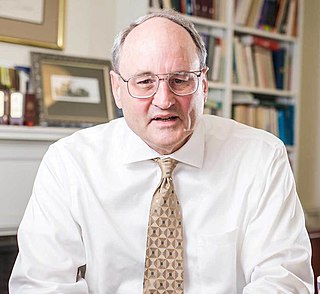Related Research Articles

SPSS Statistics is a statistical software suite developed by IBM for data management, advanced analytics, multivariate analysis, business intelligence, and criminal investigation. Long produced by SPSS Inc., it was acquired by IBM in 2009. Versions of the software released since 2015 have the brand name IBM SPSS Statistics.

The American Political Science Association (APSA) is a professional association of political science students and scholars in the United States. Founded in 1903 in the Tilton Memorial Library of Tulane University in New Orleans, it publishes four academic journals: American Political Science Review, Perspectives on Politics, Journal of Political Science Education, and PS – Political Science & Politics. APSA Organized Sections publish or are associated with 15 additional journals.

Robert Owen Keohane is an American academic working within the fields of international relations and international political economy. Following the publication of his influential book After Hegemony (1984), he has become widely associated with the theory of neoliberal institutionalism in international relations, as well as transnational relations and world politics in international relations in the 1970s.
Richard Francis Fenno Jr. was an American political scientist known for his pioneering work on the U.S. Congress and its members. He was a Distinguished University Professor Emeritus at the University of Rochester. He published numerous books and scholarly articles focused on how members of Congress interacted with each other, with committees, and with constituents. Political scientists considered the research groundbreaking and startlingly original and gave him numerous awards. Many followed his research design on how to follow members from Washington back to their home districts. Fenno was best known for identifying the tendency — dubbed "Fenno's Paradox" — of how most voters say they dislike Congress as a whole, but they trust and reelect their local Congressman.
Gary King is an American political scientist and quantitative methodologist. He is the Albert J. Weatherhead III University Professor and Director for the Institute for Quantitative Social Science at Harvard University. King and his research group develop and apply empirical methods in many areas of social science research, focusing on innovations that span the range from statistical theory to practical application.
Sidney Verba was an American political scientist, librarian and library administrator. His academic interests were mainly American and comparative politics. He was the Carl H. Pforzheimer University Professor at Harvard University and also served Harvard as the director of the Harvard University Library from 1984 to 2007.

Gabriel Abraham Almond was an American political scientist best known for his pioneering work on comparative politics, political development, and political culture.
Karen Orren is an American political scientist, noted for her research on American political institutions and social movements, analyzed in historical perspective, and for helping to stimulate the study of American political development.

James A. Morone is an American political scientist and author, noted for his work on health politics and policy and on popular participation and morality in American politics and political development.

SPSS Inc. was a software house headquartered in Chicago and incorporated in Delaware, most noted for the proprietary software of the same name SPSS. The company was started in 1968 when Norman Nie, Dale Bent, and Hadlai "Tex" Hull developed and started selling the SPSS software. The company was incorporated in 1975, and Nie was CEO from 1975 until 1992. Jack Noonan was CEO from 1992 until the 2009 acquisition of SPSS Inc. by IBM. In 2008 SPSS Inc. had sales of US$302.9 million and over 250,000 customers.

Leland Wilkinson was an American statistician and computer scientist at H2O.ai and Adjunct Professor of Computer Science at University of Illinois at Chicago. Wilkinson developed the SYSTAT statistical package in the early 1980s, sold it to SPSS in 1995, and worked at SPSS for 10 years recruiting and managing the visualization team. He left SPSS in 2008 and became Executive VP of SYSTAT Software Inc. in Chicago. He then served as the VP of Data Visualization at Skytree, Inc and VP of Statistics at Tableau Software before joining H2O.ai. His research focused on scientific visualization and statistical graphics. In these communities he was well known for his book The Grammar of Graphics, which was the foundation for the R package ggplot2.
Mathew Daniel McCubbins was the Ruth F. De Varney Professor of Political Science and professor of law, in the Department of Political Science and School of Law at Duke University.
Philip S. Yu is an American computer scientist and professor of information technology at the University of Illinois at Chicago. He is a prolific author, holds over 300 patents, and is known for his work in the field of data mining.

Jane Jebb Mansbridge is an American political scientist. She is the Charles F. Adams Professor of Political Leadership and Democratic Values in the Kennedy School of Government at Harvard University.

Henry E. Brady is an American political scientist specializing in methodology and its application in a diverse array of political fields. He was Dean of the Goldman School of Public Policy at University of California, Berkeley from 2009–2021 and holds the Class of 1941 Monroe Deutsch Professor of Political Science and Public Policy. He was elected President of the American Political Science Association, 2009–2010, giving a presidential address entitled "The Art of Political Science: Spatial Diagrams as Iconic and Revelatory." He has published academic works on diverse topics, co-authoring with colleagues at a variety of institutions and ranks, as well as many solo authored works. His principal areas of research are on political behavior in the United States, Canada, and the former Soviet Union, public policy and methodological work on scaling and dimensional analysis. When he became President of the American Political Science Association, a number of his colleagues and co-authors contributed to his presidential biography entitled "Henry Brady, Big Scientist," discussing his work and the fields to which he has contributed and has also shaped.

Micah Altman is an American social scientist who conducts research in social science informatics. Since 2012, he has worked as the head research scientist in the MIT Libraries, first as director of the Program on Information Science (2012-2018) and subsequently as director of research for the libraries' Center for Research on Equitable and Open Scholarship. Altman previously worked at Harvard University. He is known for his work on redistricting, scholarly communication, privacy and open science. Altman is a co-founder of Public Mapping Project, which develops DistrictBuilder, an open-source software.
Kay Lehman Schlozman is an American political scientist, currently the J. Joseph Moakley Professor of Political Science at Boston College. Schlozman has made fundamental advancements to the study of participation in American politics, and was a pioneer in the field of gender and politics. Her contributions include the theory of civic voluntarism, several landmark studies on the relationship between access to resources and different types of political participation, and related investigations into the nature of civic culture. Schlozman has one of the highest citation counts of any political scientist, including being among the top 50 most cited active political scientists and top 10 most cited women in the discipline. She worked closely with Sidney Verba for nearly 50 years, first as his student and then as his collaborator.

Dara Strolovitch is an American political scientist, currently Professor of Women's Gender, and Sexuality Studies, American Studies, and Political Science at Yale University. She studies the politics of race, class, gender, and sexuality in the context of intersectional societal inequality, and the representation of those who are marginalized in multiple overlapping ways.
Jane Junn is an American political scientist. She is the University of Southern California Associates Chair in Social Sciences, and a professor of political science and gender studies. She studies public opinion, political behavior, and survey methodology, including work on the relationship between education and public participation, Asian American political participation, and gender and politics.

Abraham L. Newman is an American political scientist and professor in the Edmund A. Walsh School of Foreign Service and Government Department at Georgetown University. His research focuses on the ways in which economic interdependence and globalization have transformed international politics. His work has appeared in publications such as the Financial Times, Foreign Affairs, and The New York Times.
References
- ↑ Graydon Megan (29 April 2015). "Norman Nie, political scientist and entrepreneur, dies at 72". Chicago Tribune.
- ↑ "IBM SPSS software". spss.com.
- ↑ (pp. 71-78 in Required Reading: Sociology's Most Influential Recent Books, Daniel Clawson, Ed., University of Massachusetts Press, 1998).
- ↑ "IBM In Software, Services Buys". InformationWeek.
- ↑ "Gladys M. Kammerer Award Recipients" (PDF). apsanet.org. Archived from the original (PDF) on June 9, 2012.
- ↑ Nie, Norman H.; Verba, Sidney; Petrocik, John R. (July 1999). The Changing American Voter: Norman H. Nie, Sidney Verba, John R. Petrocik: 9780735101876: Amazon.com: Books. Replica Books. ISBN 0735101876.
- ↑ Verba, Sidney; Nie, Norman H.; Kim, Jae-on (15 August 1987). Participation and Political Equality: A Seven-Nation Comparison: Sidney Verba: 9780226852980: Amazon.com: Books. University of Chicago Press. ISBN 0226852989.
- ↑ "SIQSS - Home". www.stanford.edu. Archived from the original on 2008-05-02.
- ↑ "Board of Directors". knowledgenetworks.com. 21 September 2023.
- ↑ Quentin Hardy (6 May 2010). "Power in the Numbers". Forbes.
- ↑ "Voice of the Customer Market Research Software Solutions - Confirmit". customersat.com.
- ↑ http://www.allbusiness.com/government/public-policy/5479321-1.html [ dead link ]